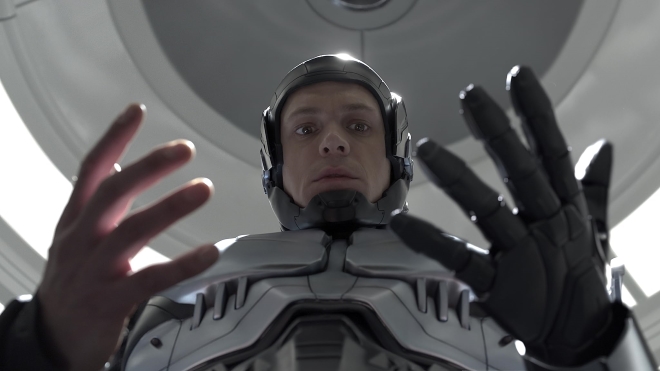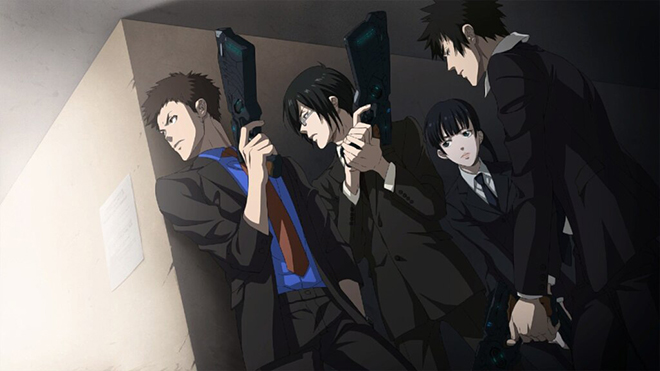Quarantine Control #203: Factual Psycho Cops

It’s tempting to think the weather hasn’t been too dire this winter season though how abnormally warm it could have been, which would have been a repeat of last year. Some regions of the United States that didn’t see snow last year got some this winter. But it’s still not all good news, not these days. It’s still been a warmer winter than average in several parts of the region and in other countries.
This is all to say that Punxsutawney Phil doesn’t get any points for guessing we’d have an early spring this year. That’s cheating now. Sorry, buddy.
Geoffrey Barnes
Robocop (2014)
Source: HBO Max (It’s been months since the change to Max, but I’m still instinctively typing “HBO Max.”)
Episodes: 1 movie (That could have started a new saga but didn’t)

The newest (as in, about ten years old by this point) Robocop film has been on my radar for a good while, but it’s yet another movie that I just couldn’t get around despite my intentions. That’s not entirely my fault. The movie’s reception didn’t help, one considered extremely divisive compared to the original film — though certainly not its sequels. It’s not good to go into a movie cynically thinking that it will be a remake/reimagining that misses the point of the original. But that was unavoidable here.
This is why the new(est) Robocop surprised me. It wasn’t cynical in quite the way I expected, though some of it was justified. It also wasn’t that bad.
The movie takes place in a near future, primarily in Detroit, Michigan, where corporations and governments, especially the former, are creating the next generation of robots to be used for warfare and policing. But the efforts of Omnicorp, led by Raymond Sellers (Michael Keaton) only get more cynical (there’s that word again) over time, with the board concluding that a robot with a human touch is the best way to appeal to the general public and to get politicians to undo federal regulations. This leads to Detroit Police Officer Alex Murphy (Joel Kinnaman) being chosen, who’s severely injured after trying to open the door of his car that was rigged to explode. He then becomes robotic. He then becomes the cop.
The story is worth going through because it does a bit more than update the scenario for the modern era, as we live in a time that’s futuristic in a different way than Paul Verhoven’s original 1987 movie anticipated. It’s also a more cynical time, which the new Robocop is adjusted for. I figured this would be a lame retread all the way through, and the story indeed seems awfully similar to the original despite some alternating character portrayals and the updated setting. The biggest change is Anne Lewis (Nancy Allen in the old films) becoming Jack Lewis (the late Michael K. Williams), a completely different character despite the similar name and role. This is how the entire movie feels: It’s familiar for what it’s referencing, but not overly so to prevent it from feeling like a total retread.
And it… works for a good chunk of the time? I enjoyed the setting update to a more modern-day Detroit (though some changes have been made to the city in the last ten years), and the intention of highlighting a plight more realistic for the modern era. Drone warfare was in the news frequently during the time of this movie’s production and release, when the Obama administration was indiscriminately using it to bomb Middle Eastern targets to much justified criticism from the left. It’s in this way that the new Robocop is not cynical in the way I expected.
I was also impressed with the acting, including from the aforementioned Keaton, Williams (despite not getting quite as important a role as Anne Lewis did), and the omnipresent Samuel L. Jackson as Pat Novak. It’s evident the writers made sure the movie diverged enough from the original film that it didn’t seem too derivative. Though some familiarity still needed to be present.
Parts of the movie felt overly similar to the original while lacking the same impact, with Murphy’s near-death experience suffering the hardest. But this fate was unavoidable considering the movie it was a remake of, and that it was made for the PG-13 rating. The sheer lack of ambition was another one of the movie’s failings. It doesn’t go in as hard on the immorality of robotics usage and drone warfare as I would have liked, but it perhaps went as far as it could have for a movie funded by a large corporation — MGM, in this case. The movie gets frustratingly close to nailing its concepts, but I’m not sure if the writers simply weren’t strong enough to fully embrace the destination, or if corporate prevented them from doing it. It could also be a little of both.
It would be pointless of me to say that the new Robocop movie is easily better than anything made after the first film, truly the lowest of bars. But it’s an entertaining film even considering that, and I respect what the production team was trying to do. Chances are the intoxicating air of cynicism that so permeated around the film before, during, and after its release doomed it from the start. Good luck to the next Robocop reboot that’s in development, especially considering it’s being funded by the friggin’ Amazon-owned MGM now.
Angela Moseley
I knocked the third game off my list for Four in February. If you’ve been following what I’ve been writing about for the last three weeks you won’t be surprised that it’s Psycho-Pass: Mandatory Happiness. Now that simply leaves me to decide my final game for the month. It’s a choice between Final Fantasy VII Remake Intergrade Intermission OR The Stanley Parable. I won’t have time to play both games in the span of a week, and worse, they’re both on Steam. In other words, there’s no option to play during my lunch breaks.
Psycho-Pass: Mandatory Happiness (2017)
Source: PlayStation Vita (also on Steam)
Episodes: 1 video game

When I first learned that Psycho-Pass: Mandatory Happiness was headed West thanks to NIS America’s localization efforts, I pre-ordered the PS Vita version of the game. I enjoy visual novels, and season 1 of Psycho-Pass is one my favorite anime series. Buying the game was an easy decision. Playing it in a timely manner was another matter entirely. At the time all I had was a PlayStation TV, one of the clunkiest pieces of Sony technology I’ve ever owned. These days the PSTV is relegated to the role of livestreaming Vita and digital PSP games. At some point I repurchased Mandatory Happiness on Steam only to never play it there as well.
After deciding to seriously tackle games in my backlog and participating in Four in February, this anime visual novel was put on my list. Even better, thanks to a good friend, my husband and I acquired an OLED Vita. I could play Pyscho-Pass during my breaks at work. Going from an action heavy game like The Legend of Zelda: Breath of the Wild to a visual novel took a some adjustment. Psycho-Pass: Mandatory Happiness was actually more enjoyable than I had anticipated, especially after recently sitting through newer lackluster seasons of the anime.
A medical cyborg has gone missing from the Public Safety Bureau hospital in Sado Marine City. Unknown to anyone else, a rouge AI program named “Alpha” has taken what he deems to be his “toy.” He claims that his mission from his mother is to bring happiness to people. Meanwhile, the Public Safety Bureau Criminal Investigation Team’s Division 1 receives two new members. The first is an Inspector named Nadeshiko Kugatachi. Despite recently becoming an Inspector, she has no memories of her childhood or recent life. The second member is an Enforcer named Takuma Tsurugi. In the quest to find his childhood friend, Yukari, he became a latent criminal. He hopes that by becoming an Enforcer and working within the PSB in Tokyo, he’ll be able to find his friend’s whereabouts.
Not long after both of them join, strange cases begin to crop up. They all tie back to Alpha and his new cyborg body in some way as he seeks a way to make people happy while keeping their Psycho-Pass hues clear.
Mandatory Happiness plays out like an episode of Psycho-Pass from season 1. Since the anime’s screenwriter, Gen Urobuchi did have a hand in crafting the scenario for this game. On the surface it seems like Alpha is trying to subvert the Sybil system, but at some point it becomes clear he’s just giving people what they want. The problem is that, they’re often unhinged in some way, and his actions just make them worse. He’s unintentionally become a threat and is actively harming the people he seeks to save.
I’ve only had the chance to tackle Takuama Tsurugi’s route. The first thing that I appreciate is that he’s not a self-insert character. He has his own motivations and personality. As the player, you merely guide the character’s actions via numerous decisions, but whatever they do is still in-character. It’s akin to reading a first-person perspective choose your own adventure novel. By going through Tsurugi’s arc, you realize he’s a rash, somewhat traditional, but ultimately romantic type of person. He sees his own past mistakes in people, and tries his best to help them not make similar mistakes. In short, he’s passionate about helping people and believes people have the capacity to change for the better.
On the negative side, I can see why he became a latent criminal. He has a natural tendency to obsess over people, and can jump into action before thinking. Hilariously, this is how I received one of his bad endings. During a critical decision-making moment, I wondered what happened if he actually tried to catch a Molotov cocktail with his bare hands. It did not go well and he died. Fortunately, this game allowed me to save scum, so I could just pick up where I left off without having to restart the chapter. Tsurugi was still going to rush in, but at least I could discover a less self-destructive way for him to do so.
Throughout the game, I was given choices to experience certain events with select characters, go to therapy, tamper down Tsurugi’s worst impulses, and even have him take his medication. Even if you come to a bad end in the game, it auto-saves. So I suspect that it’s taking various actions into consideration when deciding which of his six endings he’ll ultimately receive. I played it relatively straight-forward as I held the man back from making the worst choices, had him take his medicine and not punch another man in the face who probably deserved that punch. He was an oddly relatable character, especially when it came to keeping his impulsiveness and anger in check. I’ve been there, when I let my worst emotions get the better of me, and took actions that I wish I could take back. So it was satisfying to be praised through Tsurugi for keeping himself in check.
That said, it’s still a video game, and I’d love to go back and see where letting him give into his worst desires takes him. Would he even solve the case, or would he end up back in a jail cell, or dead? After all, I only saw three out of six possible endings, and I got his true ending– which was bittersweet at most. To be honest, I think the bulk of this game’s mystery is with Nadeshiko Kugatachi’s route, which I’ve only just started. At some point during Tsurugi’s route, I realized she may have recovered some of her memories, but never admits this to Tsurugi, despite their paths being intertwined at some point. To get the fuller story, I need to play as Kugatachi.
Even though I made one successful run of Psycho-Pass: Mandatory Happiness which took me about six hours, I still I have unfinished work to do with Kugatachi’s route. Still, I’d recommend this game to anyone who enjoyed the first season of Psycho-Pass and likes visual novels. Watching the first season of anime before playing the game is a must, as much of the context of this visual novel will be lost without that understanding of the universe found within the anime.
Joseph Daniels
With all the talk I’ve made against an all digital future, it sometimes sounds like I’m against digital only stuff, but I’m not. For example, a friend and I made arrangements last week to hang out on Discord and watch Hazbin Hotel, so after I wrote my Quarantine Control contribution for the week, we watched the entire series in one sitting. I can confirm that I wasn’t lost by not watching the pilot before watching the series, but I assume your mileage may vary depending on how much you’re able to pay attention to the details that are present in the first official episode on Amazon Prime.
I feel like Hazbin Hotel is the kind of modern success story that you wouldn’t be able to get away with if digital distribution wasn’t a thing. Digital distribution is also a great way for independent creators to put their games out into the world. Dust: An Elysian Tail probably wouldn’t have happened if not for the Xbox Live Arcade. Despite all of YouTube’s problems, it’s still the most convenient way for people to release video content to the Internet and potentially get it seen by a wide audience.
It’s been a long while since I’ve mentioned any podcasts I might be listening to, but now is probably the best time to bring them up, considering how I feel about the ways in which digital distribution should not be failing us but is. Most podcasts are available to be downloaded to your device and once you have the file, it’s yours forever. They don’t expire, the people who made the podcast can’t reach into your device and take it back, and most of the time they’re distributed for free and your support is optional. You don’t need to buy one, you can pay after the fact if you can afford to and you think there’s value in the podcast.
Not every podcast lasts forever, of course, and most podcasts that have disappeared did so when the creators stopped updating them and the domain expired. Others will delete early episodes, making it difficult to want to start one if you discover they’re 400 episodes in but you’re expected to start at, say, episode 273. Any continuity callbacks to earlier episodes will fly over new listeners’ heads. It makes me not want to start a podcast, no matter how appealing it sounds to me, if I can’t listen to the first couple hundred episodes. Even if there’s already 400 episodes, I’m willing to give a podcast a try if I can jump in at the first one.
Factually! With Adam Conover (2019)
Source: Official Website; your favourite podcast provider
Episodes: Ongoing (currently 249)

I don’t know why I haven’t provided the official websites before now, that’s something I should probably get added to past Quarantine Control columns.
Adam Conover is a comedian who also loves to cut through lies and bullshit and make the truth about things known. This is pretty much the concept behind Adam Ruins Everything. He’s like Penn & Teller, but kinder and gentler. Whereas they were more aggressive in their approach, calling people assholes and calling bad information “bullshit” a lot, to the point where they made it the title of their show, Adam Conover likes to discuss ideas and misinformation from the point of view of someone who loves to learn new things and is enthusiastic about other people learning new things, too. Whereas Penn & Teller take a position of arrogance, acting like they know everything and we know nothing, Adam lives more like the famous quote from Socrates. “All I Know Is That I Know Nothing.” Factually! is a podcast where he discusses ideas with experts in the field and perhaps learns stuff along the way. Two of the most recent episodes offer an interesting debate on whether we have free will or not. Other recent episodes have talked about unions, Mars colonization, tech hype and so on. This is a good podcast for me to listen to whenever I’m grinding at things in a video game, or if my progression is too slow and I’m getting tired of the music in the current area. I’ve been playing Rainbow Skies lately and I’m finding the battles are taking a while to get through, because they’re playing out like a tactical RPG but without the difficulty of a tactical RPG, so battles will just last a while for no real reason. It’s making side quests in the game feel a little like a chore, so it’s the perfect time to listen to a podcast, especially one which attempts to teach its listeners new things and propose interesting ideas.
I think what sets this podcast apart from The Joe Rogan Experience is that Adam Conover won’t bring people onto his show that he knows are spreading misinformation. Joe Rogan will, because it benefits him and the people he supports politically, and he’ll hide behind “oh, I’m just asking questions” as he pretends he doesn’t really believe what his guests say if he’s called out for the company he keeps on his show. I think that’s the best litmus test to see whether a podcast is worth listening to. If the host has to play at backpedaling a lot whenever he has controversial guests on his show, that’s probably not a good podcast.
With over two hundred episodes already available, this is going to be a nice, lengthy binge if you want to give it a try. The nature of the podcast also means you don’t usually have to worry about continuity (aside from the two episodes about free will) and can jump in anywhere. You could even watch the YouTube versions if you’re on your PC.
This Week’s Short Film
Margo and the Snow (2023)
The lede only cracked the surface of the fun that awaits us as climate change inevitably grips us hard. Buckle up, because there’s no way out of this now. Perhaps the thoughts will be a bit more positive come next week.





